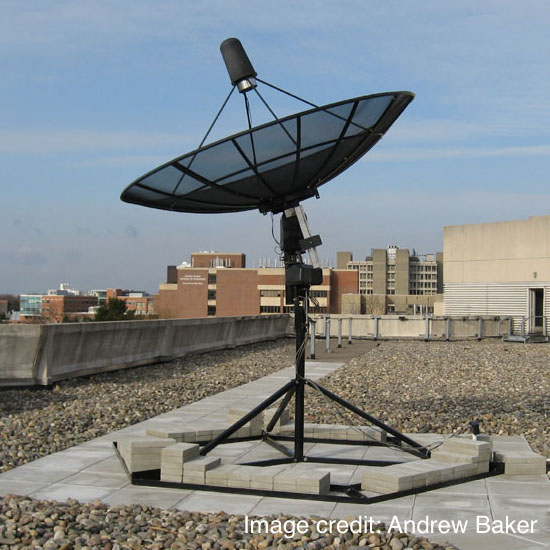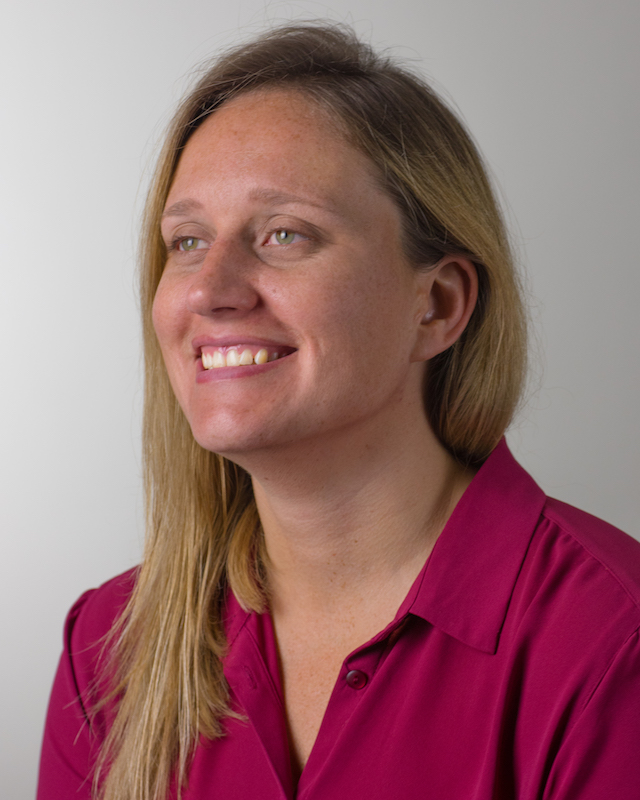Teaching
 Physics education research has overwhelmingly found that students learn best
when actively engaged in class—the best way to learn physics is to actually
do physics. I believe this same style of active learning should also be used
to teach students how to apply their physics knowledge. Therefore, when I teach
physics and astronomy, I integrate hands-on activities with modern applications
so students practice how physics is applied in research and industry.
Physics education research has overwhelmingly found that students learn best
when actively engaged in class—the best way to learn physics is to actually
do physics. I believe this same style of active learning should also be used
to teach students how to apply their physics knowledge. Therefore, when I teach
physics and astronomy, I integrate hands-on activities with modern applications
so students practice how physics is applied in research and industry.
 My first experience leading interactive classrooms was as a teaching assistant
for Extended Analytical Physics
(EAP), an introductory physics course for freshman
engineering majors with poor math preparation. In EAP, students learn classical
mechanics in cycles of interactive lectures and tutorials that build up to an
open-ended laboratory test. I won the
Richard J. Plano Outstanding Teaching Assistant Award
for cultivating understanding through active learning and building enthusiasm
for physics in this course and as a teaching assistant for Observational Radio Astronomy.
My first experience leading interactive classrooms was as a teaching assistant
for Extended Analytical Physics
(EAP), an introductory physics course for freshman
engineering majors with poor math preparation. In EAP, students learn classical
mechanics in cycles of interactive lectures and tutorials that build up to an
open-ended laboratory test. I won the
Richard J. Plano Outstanding Teaching Assistant Award
for cultivating understanding through active learning and building enthusiasm
for physics in this course and as a teaching assistant for Observational Radio Astronomy.
Based on how effective I found active learning in EAP, I have pursued further training
on interactive teaching best practices through the Center for Astronomy Education’s Teaching Excellence Workshop.
I have also begun taking courses through the
MacPherson Institute for Leadership, Innovation, and Excellence in Teaching
at McMaster that provide me with both a theoretical background and peer-evaluated
experience in preparing university-level courses.
Awards
Teaching Experience
- Tutorial Leader, Integrated Science 3A12: Light, the Universe, and Everything, McMaster, Winter 2017 (Instructors: Dr. Sarah Symons, Dr. Ralph Pudritz).
- Prepared and delivered three tutorials (6 undergraduate students) on AGN unification and helped students design modules to instruct the rest of the class on this topic.
- Guest Lecturer, REU Summer Lecture Series, Cornell, Summer 2015 & 2016.
- Prepared and delivered one lecture (~20 undergraduate students) on high-redshift galaxy discovery techniques.
- Guest Lecturer, ASTR 2211: Stars, Galaxies, and Cosmology, Cornell, Spring 2016 (Instructor: Dr. Dominik Riechers).
- Delivered one lecture (~20 undergraduate science majors) on the end states of high-mass stellar evolution.
- Guest Lecturer, ASTR 1195: Observational Astronomy, Cornell, Fall 2014 & 2015 (Instructor: Dr. Gordon Stacey).
- Delivered lectures (~20 undergraduate students) on telescopes, blackbody radiation, atomic structure, and the Milky Way.
- Guest Lecturer, ASTR 3303: Galaxies Across Cosmic Time, Cornell, Fall 2013 (Instructor: Dr. Dominik Riechers).
- Delivered one lecture (3 undergraduate students) on high-redshift galaxy discovery techniques.
- Co-leader of Rutgers TA Orientation workshop on Fostering Collaboration and Discussion in the Sciences and Engineering, Rutgers, August 2012.
- Prepared and delivered a training session to new Rutgers STEM teaching assistants on why and how to promote collaboration and discussions in science class rooms.
- Physics Tutor, Bunting-Cobb Residence Hall for women majoring in STEM, Rutgers, Fall 2010-Spring 2013, part of the Douglass Project.
- Tutored all levels of physics, from introductory descriptive physics to advanced electricity & magnetism, for three hours a week (1-10 undergraduate students per week) in a dorm for female STEM majors.
- Guest Lecturer, Ph343: Observational Radio Astronomy, Rutgers, Spring 2011 (Instructor: Dr. Andrew J. Baker).
- Prepared and delivered one lecture (~15 undergraduate students) on the molecular interstellar medium in galaxies.
- TA, Ph115: Extended Analytical Physics I, Rutgers, Fall 2009 (Instructor: Dr. Suzanne Brahmia).
- Led two recitation sections, twice a week (~20 undergraduate students each), of algebra-based introductory mechanics for engineering majors with poor math backgrounds, using active learning and lab projects.
- TA, Ph343: Observational Radio Astronomy, Rutgers, Spring 2009 (Instructor: Dr. Andrew J. Baker).
- Guided four bi-monthly sections (2-3 undergraduate students each) in making observations with a small radio telescope.
- UTA, Ay1: The Evolving Universe, Caltech, Spring 2007 (Instructor: Dr. Charles Steidel).
- Prepared and delivered bi-monthly recitation lectures (~20 students) reviewing the important topics covered in class and hosted weekly office hours for an introductory astronomy class for non-majors.
Pedagogical Training
- Education 751: Principles & Practices of University Teaching; MacPherson Institute for Leadership, Innovation, and Excellence in Teaching; McMaster; Fall 2017.
- Course on the pedagogical approaches and technqiues related to the design and delivery of university education, including opportunities to practice and hone one's teaching effectiveness. Topics include: course design, lesson planning, assessment, and supporting learning for a diverse student body.
- Education 700: Essential Skills in Teaching and Learning (II); MacPherson Institute for Leadership, Innovation, and Excellence in Teaching; McMaster; Summer 2017.
- Completed six workshops on topics like inquiry based learning, emerging learning technologies, and intercultural competency.
- Education 600: Essential Skills in Teaching and Learning (I); MacPherson Institute for Leadership, Innovation, and Excellence in Teaching; McMaster; Winter 2017.
- Completed six workshops on topics like leading effective labs, lesson planning, and accessibility.
- Center for Astronomy Education's Tier 1 Teaching Excellence Workshop, 227th Meeting of the American Astronomical Society, January 2016.
- Learned best practices for implementing interactive learning in the Astronomy 101 classroom.
Students Mentored
- Riccardo Pavesi, Cornell University, PhD student (Faculty advisor: Dr. Dominik Riechers).
- Renato Mazzei, University of Virginia, Cornell REU summer student (Faculty advisor: Dr. Dominik Riechers).
- Sheri Lopez, University of New Mexico, Cornell REU summer student (Faculty advisor: Dr. Dominik Riechers).
- Kirsten Hall, University of North Carolina, Rutgers REU and Rutgers Research in Science & Engineering summer student (Faculty advisor: Dr. Andrew J. Baker).
- Whitney Kropat, University of Washington, Rutgers Research in Science & Engineering summer student (Faculty advisor: Dr. Andrew J. Baker).
